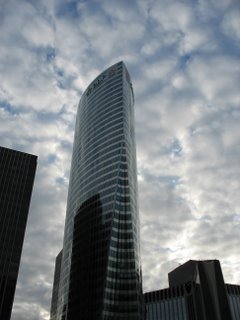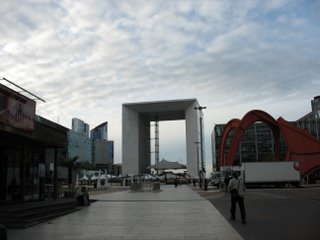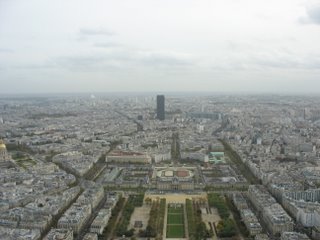My friend Laura, who is now in London, and a friend of hers from Toronto were visiting Paris this weekend so i finally went up the Eiffel Tower. Despite being a bit cold and blustery, there were many lines involved. We waited for forty minutes at the bottom to go up to the second level, another forty five minutes at the second level to go up to the top, and at lease another forty minutes to go back down. It must be said, however, that the view is worth the wait.
While the pictures can speak for themselves, there was one thing at the top which i feel epitomizes some of the problems in France. At the top of the tower there are a number of dioramic scenes, which do not appear to be terribly old, portraying Gustav Eiffel planning or overseeing the construction of the tower. A few of these are life size and involved rather ridiculous looking mannequins. One such scene shows Eiffel welcoming Thomas Edison on a visit. The accompanying plaque, which was quite large and made of highly polished bronze, explained that Edison was an American inventor and physician.
The problem is that Edison was not a physician, he was a physicist. Physician, is a mistranslation of the French word for physicist, physicien. Now, this plaque is affixed in a prominent position in the most celebrated tourist attraction in the world, which it should be added receives hundreds of thousands, if not millions, of English-speaking tourists each year. The size of the plaque, and the whole diorama project, suggests that a not inconsiderable sum of money and time was spent therein. And yet, no one bothered to run the plaque by someone who knew English, and who Edison was.
This half-assed, mistranslated use of English provides a quintessential example of one of the darker facets of France's borrowings from the Anglo-Saxon world. Namely, that while France is pragmatic enough to realize that it must advance and adapt itself to modern, largely Anglo-Saxon forces, they remain in many areas unable to look past their own preexisting notions. This often leads to a botched implementation of these foreign ideas, which in turn reinforces the French suspicion that anythng Anglo-Saxon is insensitive and inferior.
I saw this most clearly in a discussion in my macro-economy class. The prof, an expat Canadian, was attempting to explain how France's almost unparalleled job-protection legislation was one of the root causes of France's high unemployment and explosive social unrest. He detailed how making it harder to fire people makes employers less inclined to hire people. In France, if a hat-maker has a bumper year, such that they cannot meet the demand for their hats, the will not hire more staff to meet this demand. The reason being that if this bumper year is followed by a slow year in hat sales next year the employer will be unable to fire these extra workers and the whole company may fail. So, if you have a job in France it is basically gold-platted. But, the cost of these jobs is born by all of those who are out of work (roughly 11% of the French population, though that 11% doesn't include those so alienated from the job market that they have given up even trying to find a job).
My prof's solution to this problem? Make it easier to fire people. One of the French students objected immediately: "The cost to workers of such a liberal system would be too high." His actually objection was a bit more dramatic and included something about pregnant, single mothers but i don't remember it exactly. What this French student didn't understand, on the one year anniversary of weeks of riots in French suburbs (an anniversary marked, i might add, by several bus burnings one of which put a woman in intensive care), was that the current system already had a cost. The 11% overall unemployment rate hides the fact that more than 20% of under-25s are out of work, and if you are black or Arab from the suburbs and under-25 there is a 60% chance you don't have a job. And none of these numbers look like they will get any better soon.
Yet, to the French student allowing more freedom for companies to fire employees was just too costly. In my opinion, he didn't understand the idea, but he knew he was against it and he was not willing to put any more time into thinking about the issue. And so, this young man from France's most prestigious social sciences school will certainly find himself one of those gold-platted jobs. And when immigrants riot in the banlieus, rather than seeing young people frustrated because they have no future, he will see Muslims unable to integrate into the secular European system. It is this kind of stubborn adherence to tired, failed ideas in the face of demonized, Anglo-Saxon style reforms that i see reflected in a mistranslated plaque on top of the Eiffel Tower.






